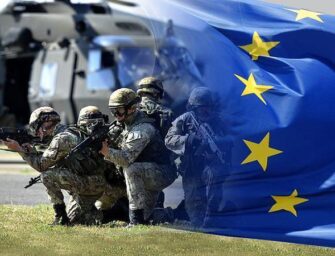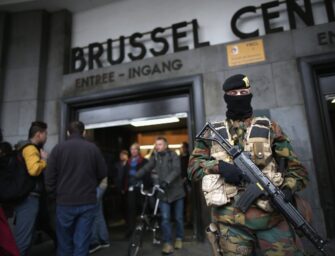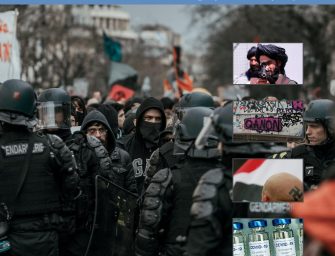#ReaCT2021: 2nd Report on Radicalization and Counter-Terrorism
 In my role as Executive Director of the ReaCT Observatory, I am honoured to introduce #ReaCT2021, the 2nd Report on Radicalisation and Counter-Terrorism in Europe.
In my role as Executive Director of the ReaCT Observatory, I am honoured to introduce #ReaCT2021, the 2nd Report on Radicalisation and Counter-Terrorism in Europe.
This report offers a concise analysis on the evolution of radical ideologies and terrorist threats in accordance with the European Union directive 2017/541 on the fight against terrorism and is meant as a useful contribution, within the wider public debate, to the harmonisation of member States’ discrepancies around what should be defined and treated as terrorism.
The Observatory mainly focuses on jihadism; however, we make sure to afford enough room and support for studies on other forms of terrorism, ideological radicalisation and social deviance, as well as “conspiracy theories” leading to violent outcomes.
In their assessments, the authors who submitted their work for this issue of #ReaCT2021 took into account the repercussions of new social and conflict dynamics brought about by COVID-19.
Due to other priorities, the pandemic seemed to have sidelined terrorism when, all of a sudden, October 2020 revived the threat which had apparently been overcome. From early September to early November, a successive chain of events clearly highlighted a dramatic and articulated scenario. Those sixty days of fear tell us that terrorism is now a “normal” rather than an ‘exceptional’ phenomenon, as an instrument of the ongoing conflict.
2019-2020: the evolution of European jihadist terrorism
In 2019 according to Europol there were 119 successful, failed or thwarted attacks: 56 of these were carried out by ethno-nationalist and separatist groups; 26 by extreme left radical and anarchist groups; 6 by far right groups; 24 were jihadist, of which 3 were successful and 4 unsuccessful. In the same year, START InSight’s database listed 19 jihadist actions / events (as compared to the 7 reported by Europol); in 2020, the number goes up to 25.
In 2019, jihadists were responsible for all deaths from terrorism in Europe: according to Europol, 10 people lost their lives and 26 were injured (1 person was injured in a far-right attack). START InSight recorded a higher number of people with injuries (48), who were mostly victims of marginal and emulative attacks. In 2020 there was a significant increase in deaths: 16 people were killed and 55 were injured.
The long wave of terrorism which hit Europe following the emergence of the “Islamic State” phenomenon recorded 146 jihadist attacks from 2014 to 2020: 188 terrorists took part in these attacks (59 among them died in action); 406 people lost their lives; 2,421 were injured (START InSight’s database).
Cases of recidivism are on the rise: 3 out of 10 in 2020. START InSight also spotted an increase in actions carried out by terrorists already known to European police forces or intelligence services: 54% of the total in 2020.
An increase in the number of irregular migrants heightens the potential risk of terrorism: 20% of terrorists are irregular immigrants. In France, the number of irregular immigrants involved in terrorist attacks is growing. Until 2017, no attack had seen the participation of irregular immigrants; in 2018, 15% of terrorists were irregular immigrants: in 2020, they reached 40%.
Islamic State and al-Qaeda online terrorist propaganda during the Covid-19 emergency
Propaganda activities carried out during the Covid-19 pandemic and the attacks which took place in Paris, Nice and Vienna, recall how dynamic terrorism associated with the Islamic State and al-Qaeda remains, especially through the Internet. In particular, the Islamic State confirmed its aggressive narrative, identifying the Coronavirus as a “soldier of Allah”. An ally, set out to punish the “infidels”, above all the military and police forces.
The concepts and importance of preventing and countering violent extremism (PVE/CVE)
PVE and CVE gradually became an integral part of the global counter-terrorism architecture. In order to be long-term and effective, these policies and projects require a constant dialogue among researchers, practitioners, law enforcement agencies and legislators which also sets out priorities and expectations. Measuring the results of these activities remains a difficult task but several European think tanks are already bent on the issue.
Countering radicalisation and terrorism via criminal law: problems and perspectives
By its very nature, counterterrorism criminal law does not affect the causes of radicalisation and terrorism. An overarching and disproportionate resort to criminal law may even produce crime-inducing side effects: radicalisation shall be addressed as a reversible process. Counterterrorism criminal law in Europe is generally prison-based, even with regard to facts that arguably do not harm legal goods or interests.
The terror threat in the UK. The challenge: identify, define, arrest and convict
The complexity of the terror threat picture faced by the UK was recently highlighted through court cases which have frustrated the efforts of the security and intelligence forces. The cases that are now emerging are so disconnected from terrorist networks, are planning such random acts and the tools of terrorism are becoming so banal that it has become almost impossible to entirely shield yourself from the threat. But it has also become almost impossible to prove who might be going in this direction. This is creating a new generation of radicals that authorities struggle to identify, define, arrest and convict.
A look at the Balkan gate to Europe
The attack which took place in Vienna in November 2020 drew attention to the issue of terrorism in Europe, especially in the Balkan Area. It also focused such attention on jihadist presence in the Balkan countries, which could become a potential logistical hub for jihadism towards Europe.
Lessons learned from Kosovo’s experience in repatriating former foreign fighters: the small Western Balkan nation of Kosovo repatriated 110 citizens, including men, women, and children, in April 2019, making it one of a very small number of countries that has actively repatriated citizens involved with the Islamic State. The paper also includes what lessons can be learned by EU countries in handling the complex issue of how to manage the return of foreign fighters and their families.
The other terrorisms: far-right, extreme left and the new QAnon phenomenon in pandemic times
The pandemic caused by the Covid-19 virus has also had significant effects on the relational and communicative strategies and methodologies typical of both far-right and extreme left-wing environments. Right-wing violent extremism, a phenomenon in expansion in the West, appears to be acquiring a transnational character and has an emerging symbiotic, mutually-reinforcing interdependent relationship with Islamist extremism. This interdependence poses additional threats to European security.
A threat to democracy is QAnon, a conspiracy theory movement active in more than 70 countries and that presents a high risk of radicalization in Europe. It should be closely monitored because of its potential for violent actions.
Thanks to all of the authors who contributed to this Report. My gratitude also goes to the two co-editors who have given their fundamental input: Chiara Sulmoni, President of START InSight, and Flavia Giacobbe, Director of Airpress and Formiche.
Claudio Bertolotti – Executive Director
FULL REPORT AVAILABLE HERE (ITA/ENG LANGUAGE)
REPORT INDEX
Co-editor’s note: Flavia Giacobbe, Director Formiche and Airpress
Flavia Giacobbe
Introduction: terrorism at the time of Covid-19
Claudio Bertolotti
Numbers and profiles of jihadist terrorists in Europe
Claudio Bertolotti
Sixty days of fear: the lesson learned
Marco Lombardi
Countering radicalisation and terrorism via criminal law
Francesco Rossi
The Islamic State and Al-Qaeda online terrorist propaganda during the Covid-19 emergency. Comparing strategies
Stefano Mele
Terrorism and immigration: links and challenges
Claudio Bertolotti
The terror threat in the UK
Raffaello Pantucci
Jihadist extremism in Europe. The concepts and importance of PVE/CVE
Chiara Sulmoni
Tools to counter violent radicalisation: a study case
Alessandra Lanzetti
Terrorism in Vienna: the Balkan clue
Enrico Casini
Kosovo’s experience in repatriating former foreign fighters
Matteo Bressan
Extreme right and extreme left in pandemic times: some reflections
Barbara Lucini
Right-wing Violent Extremism, Its Transnational Character, and Its Interdependent relations with Islamist Extremism
Mattia Caniglia
QAnon: a threat to democracy
Andrea Molle
FULL REPORT AVAILABLE HERE (ITA/ENG LANGUAGE)











































There are no comments
Add yours